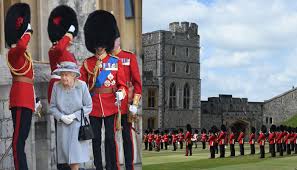This year’s celebrations of Queen Elizabeth’s seven-decade reign will obscure a less cheerful reality for the world’s most powerful royal family: the British monarchy is being questioned in ways that have been inconceivable for most of the last 70 years.
The family of 95-year-old Elizabeth, who became queen on Feb. 6, 1952, has rarely faced such scrutiny and negative news, from her son Prince Andrew’s sex abuse court case to her grandson Prince Harry and his wife’s charges of racism in the royal household.
The queen is held in such high regard that the nearly 1,000-year-old institution appears to be safe while she is alive. What happens after that is less certain.
“For most people, the monarchy and the queen are synonymous,” said Graham Smith, chief executive of the anti-monarchy organization Republic, which has increased its agitation.
“Once the queen’s reign comes to an end, all bets are off as to where popular opinion will go.”
While simply an act of parliament would be required to remove the monarchy, he predicted that a referendum would be required first.
Since her ancestor Norman King William I’s invasion of England in 1066, the monarchy’s fortunes have ebbed and flowed, but Britain has only been a republic for the decade following King Charles I’s execution in 1649.
Low points of Elizabeth’s reign occurred in the 1990s when three of her children’s marriages failed and Princess Diana, the first wife of heir Prince Charles, died in 1997.
The public outpourings of support at past jubilees, Elizabeth’s grandson – and future king – Prince William’s royal marriage in 2011, and the birth of royal children were all highlights.
The four-day celebrations in June to honor Elizabeth’s platinum jubilee would offer “national moments of reflection on the queen’s 70 years of service,” according to Buckingham Palace.
When asked about the monarchy’s long-term prospects, a spokeswoman declined to answer.
EXTINCTION OF THE ROYAL FAMILY?
Supporters regard the monarchy as a stabilizing force, citing the economic benefits that tourism offers to the country. Opponents contend that the organization is a bastion of unfair privilege, partially subsidized by taxpayers and tainted by the actions of some members.
Andrew, 61, was deprived of his royal patronages and military titles this month as he defends charges of sex abuse in a U.S. lawsuit. He is rumored to be Elizabeth’s favorite of her four children.
“It is an extinction-level event for the monarchy. You can’t spend a thousand years convincing everyone that you’re exceptional, just to find out in real-time, in a court case, that you’re not “The Sunday Times published a column by Camilla Long.
Meanwhile, Prince Harry, once the most popular member of the Windsor family and his American wife Meghan left their royal duties to relocate to Los Angeles, where they have launched a scathing attack on the royal family and Buckingham Palace.
Following charges that he offered honors in exchange for donations, Michael Fawcett, Charles’ right-hand man, and long-time confidant resigned from his position as director of one of the heir’s major charities.
Fawcett has remained silent about the allegations.
“Whether (these scandals) are sufficient in and of them to persuade enough people in Britain that we should abolish the monarchy,” royal biographer Penny Junor remarked.
IS THERE A CHANGE IN OPINION?
According to one December poll; a comfortable majority of people feel the monarchy should be preserved, with 83 percent favoring Elizabeth. However, there are some concerning indicators for the royals.
Barbados deposed the queen as head of state last November; Charles is far less popular, and support among younger people looks to be waning, with polls indicating that a majority of those under 30 favor abolishing the monarchy.
“I don’t think it’s that important anymore,” said Margaux Butler, a 20-year-old student in Windsor, where the queen now spends the majority of her time.
“That is a notion I loathe (of Charles being king). I don’t mind the royal family in general, but I think he’s a little controversial, and I believe many younger people share my opinion.”
However, it will take more than ambivalence toward Charles or embarrassing tabloid articles about Andrew or Harry to bring the monarchy to an end. Indeed, critical pieces about Charles, Camilla, William, and Kate, who have all been heavily criticized in the past, are now rare in those same newspapers.
For some Britons, Prime Minister Boris Johnson’s scandals and Donald Trump’s tumultuous administration in the United States make having an elected head of state a less appealing prospect.
The royals have the support of the establishment as well.
The ruling Conservative Party has shown no evidence of supporting the abolition of the monarchy, but the main opposition Labour Party was hammered in the 2019 election, partially due to its former leader’s apparent lack of patriotism.
After Prince Philip’s death last year, Johnson noted how Elizabeth’s 73-year-old husband had assisted his wife in steering “the monarchy so that it remains an institution unquestionably crucial to the balance and happiness of our national life.”
The royal family is also aware of the need to adapt to a changing environment.
While politicians face “brutal” public rejection at the polls, “the message is frequently difficult to decipher for us, a royal family,” Elizabeth, who has never given an interview during her reign, remarked in a 1997 address.
“Throughout the years of our marriage and my reign as your queen, I have done my best… to understand it appropriately. And we’ll make an effort as a family to do so in the future.”

















